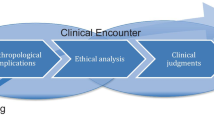Abstract
The benefits of Artificial Intelligence (AI) in medicine are unquestionable and it is unlikely that the pace of its development will slow down. From better diagnosis, prognosis, and prevention to more precise surgical procedures, AI has the potential to offer unique opportunities to enhance patient care and improve clinical practice overall. However, at this stage of AI technology development it is unclear whether it will de-humanize or re-humanize medicine. Will AI allow clinicians to spend less time on administrative tasks and technology related procedures and more time being present in person to attend to the needs of their patients? Or will AI dramatically increase the presence of smart technology in the clinical context to a point of undermining the humane dimension of the patient–physician relationship? In this brief commentary, we argue that technological solutions should be only integrated into clinical medicine if they fulfill the following three conditions: (1) they serve human ends; (2) they respect personal identity; and (3) they promote human interaction. These three conditions form the moral imperative of humanity.
Similar content being viewed by others
References
Heidegger, M. (1954/1977). The question concerning technology. In: D. F. Krell (Ed.), Basic writings. New York: Harper & Row.
Jotterand, F., & Giordano, J. (2011). Transcranial magnetic stimulation, deep brain stimulation and personal identity: Ethical questions, and neuroethical approaches for medical practice. International Review of Psychiatry, 23(5), 476–485.
Pellegrino, E. D., & Thomasma, D. C. (1993). The virtues in medical practice. New York: Oxford University Press.
Rainey, S. & Erden, Y. J. (2020). Correcting the brain? The Convergence of neuroscience, neurotechnology, psychiatry, and artificial intelligence.
Author information
Authors and Affiliations
Corresponding author
Additional information
Publisher's Note
Springer Nature remains neutral with regard to jurisdictional claims in published maps and institutional affiliations.
Rights and permissions
About this article
Cite this article
Jotterand, F., Bosco, C. Keeping the “Human in the Loop” in the Age of Artificial Intelligence. Sci Eng Ethics 26, 2455–2460 (2020). https://doi.org/10.1007/s11948-020-00241-1
Published:
Issue Date:
DOI: https://doi.org/10.1007/s11948-020-00241-1




